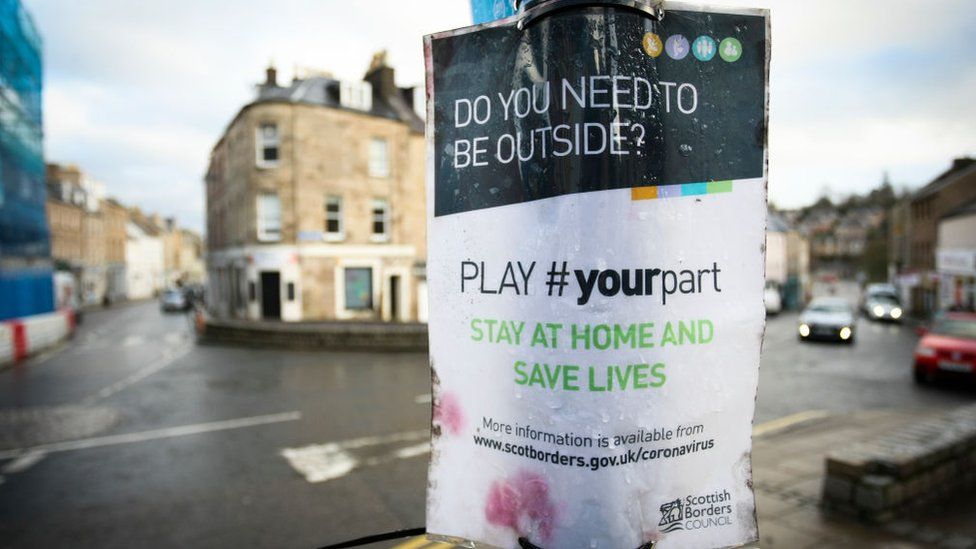Covid in Scotland: Sturgeon to announce outcome of lockdown review
- Published
- comments

Nicola Sturgeon is to announce later whether Scotland's Covid-19 lockdown is to continue past the end of January.
The first minister said Tuesday's statement at Holyrood would concern the "duration" of restrictions rather than whether any new ones would be imposed.
Minsters will also decide at a cabinet meeting whether schools will be allowed to re-open in full from 1 February.
Education Secretary John Swinney has suggested it would be a "tall order" for pupils to return to classrooms.
Ms Sturgeon said on Monday that she did not want to "raise parents' expectations", saying transmission of the virus "is still higher than we would want it to be".
The whole Scottish mainland and several islands have been in a strict lockdown since early January, with a "stay at home" message in force.
This was initially due to run until February, but this will be reviewed by ministers on Tuesday morning with a view to having the restrictions last longer.
While Ms Sturgeon has warned that the government would consider further measures if necessary, she said "it is the duration rather than the content of restrictions that we will be looking at" on Tuesday.
The outcome of this review will then be announced to MSPs in a statement at Holyrood in the afternoon.
The review will also cover the situation in schools, with the majority learning remotely from home and only some children of key workers and vulnerable pupils being allowed into school buildings.
On Monday, the first minister said she did not want to "raise expectations" about classes returning to normal, but added that she was "not going to make any assumptions" ahead of the cabinet meeting.
She said: "I am not going to raise parents' expectations, you can see from the numbers we are seeing some positive signs in the numbers that lockdown is starting to stabilise things and tip them into decline, but transmission is still higher than we would want it to be.
"We want to get schools back as quickly as we possibly can, it is not in the interests of kids to be out of school for any longer than is absolutely necessary, but community transmission has always been a key factor in these decisions."
This echoed comments from Mr Swinney, who had previously said it would be "a tall order" for schools to fully re-open with "the virus still at a very high level in general within society".
I am expecting continuity rather than change from today's announcement on coronavirus restrictions.
The continuation of the current lockdown and presumably the extension of remote learning for most school pupils into the February break at least.
Both decisions are likely to be reviewed again next month. But it's not clear if the first minister will feel able to suggest a target date for restrictions to ease.
Cabinet will also be giving special attention to the serious Covid outbreak on Barra and considering if the level three restrictions that apply in the Western Isles remain appropriate.
While there are signs the pace at which the current wave of coronavirus is spreading is starting to slow, evidence of much greater suppression will be required before the stay at home lockdown in place across mainland Scotland is lifted.
The review comes less than a week after restrictions in Scotland were tightened, with some click and collect services ordered to close and outdoor alcohol consumption banned.
The entire Scottish mainland has been in the top level of restrictions - level four - since Boxing Day, with level three measures in place in Orkney, Shetland, the Western Isles and some islands in Argyll and Bute and the Highlands.
Scots are subject to a legal requirement not to leave home for anything other than essential purposes, such as shopping for essentials, exercise and caring responsibilities.
The number of new cases reported each day on average has begun to fall, but the number of people in hospital with the virus continues to rise and is now "significantly" above that seen in the first wave in 2020.
Ms Sturgeon said the "position overall is very precarious, very concerning in terms of the level of transmission", but said there were "some early signs to be optimistic that measures are having an effect".
The first minister will take questions from opposition leaders following her statement.
The Scottish Conservatives have voiced concerns that Covid-19 vaccines are not being rolled out quickly enough, saying the Scottish government are "trailing their own targets".
Statistics released on Monday showed that Scotland has vaccinated 264,991 people so far - 6% of its adult population.
This is lower than the figure for England, where 8% of the adult population - 3,520,056 people - have been vaccinated, and Northern Ireland, which has the highest vaccination rate in the UK at 8.7%.
Wales has a similar figure to Scotland at 6%.
England has also given a second dose of the vaccine to 427,386 people, compared to only 3,698 in Scotland.
However, Ms Sturgeon has insisted that all parts of the UK are "working to the same targets" to vaccinate priority groups, and said her government is "on track" to hit them subject to supplies arriving.
This would see care home residents, healthcare staff and all over-80s get a first dose by the start of February, with over-70s and those deemed "extremely vulnerable" by mid-February and all over-65s by the beginning of March.
By that time the government aims to be vaccinating up to 400,000 people a week on average, with all priority groups getting a first jab by early May and the rest of the adult population in line thereafter.
- Published15 January 2021